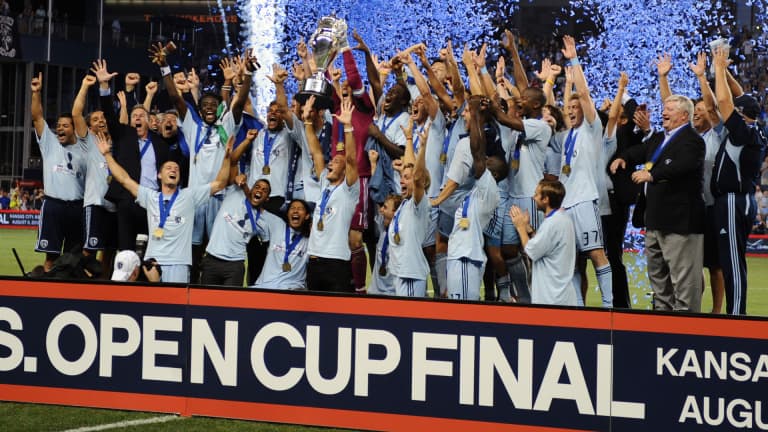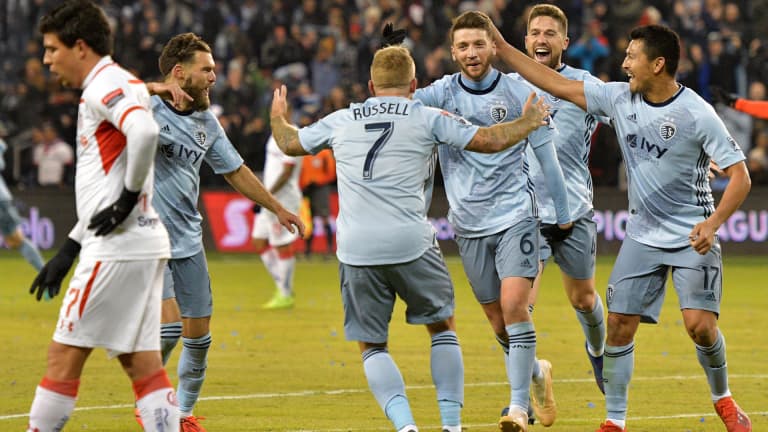Peter Vermes is the longest tenured head coach in Major League Soccer, and Sporting Kansas City’s win on Sunday over the Seattle Sounders came on the day he hit his 10-year anniversary as the manager of Sporting.
It’s been a tenure filled with many more ups than downs while Sporting KC as a club have carved out a spot as perennial contenders, accumulating numerous deep playoff runs and four major trophies along the way.
Vermes, a player in Kansas City between 2000-02, had been operating as the technical director of the team starting in 2006, and stepped into the coaching role in 2009, forever changing the culture and the trajectory of the club. However, at multiple stops, Vermes’ coaching tenure almost never happened.
“When I had first started as technical director of the team, [team co-owner] Robb Heineman had asked me what job do I want,” Vermes told MLSsoccer.com in an exclusive interview.
“At the beginning I said coaching and he said no, ‘Because I have to fire that guy.’ He said, ‘Why don’t you be in charge of the whole thing?’ So I thought about it and said, ‘OK.’ I was reserved to the idea that that’s what I was going to be doing, that was going to be my gig.”
Vermes operated as the technical director for two years, before another team in MLS came calling with a rather lucrative offer.
“I think one of the things that tells this story the best, in 2008 I was offered to go to the LA Galaxy,” Vermes said.
To coach?
“No, to be the vice president of all their soccer operations worldwide, and then be the GM for the LA Galaxy,” Vermes said. “I chose not to do it. I know Mr. Anschutz [the Galaxy's owner], I played for him in Colorado. He has a great family and is a great man and I had a great relationship with him, it was just that I had started something here and I wanted to see it through, and I believed in the vision and ideas that we had and what we wanted to become.”
A year later his opportunity to take over the team, in the original capacity he wanted to be in, presented itself. After filling in as the interim head coach for the remainder of 2009, Vermes was challenged by late Sporting KC owner Neal Patterson to fix the predicament Sporting was in, seemingly falling behind the wave of expansion teams joining the league.
“I’ll be honest, I took it a little bit personal and as a challenge more than anything else,” Vermes said. “I was thinking to myself, well I know what the vision is, I know what the philosophies are, so why don’t I just keep doing this? So that’s the reason why I wanted to keep doing it. I just didn’t feel comfortable at the time, being able to find somebody with the philosophies and the vision and everything that we wanted for the club.”
Challenge accepted. And as the story goes, it didn’t take long for Vermes and Co. to get going. After a successful rebrand and opening Children's Mercy Park, they won the 2012 U.S. Open Cup, their first trophy since 2004.

“That’s why we’re here,” Vermes said. “It’s winning cups. That’s what it is. I remember in 2012, we won our first U.S. Open cCup, and you could sense the fans, the club, the players, the staff and then the owners, there was a pride that came along with winning that, something to stick your chest out about. Then in 2013 winning the MLS Cup, those are why I do this job.”
The trophies and success certainly validated Vermes decision to become head coach, to spurn the calls from the Galaxy, and to stick with his vision. But one of the biggest things he wanted to accomplish was building a club, a real soccer club, from the ground up.
“I’ve always wanted to be a part of building a real club in the United States,” Vermes said. “Because I didn’t think that when I first started, I don’t think anybody in the league was a real club. I think today, we have a lot of real clubs in our league in a short period of time. It says a lot about our league, it says a lot about the individual ownership groups and individual staffs. But we have true clubs. I’ve been very proud of building this club for sure.”
In 10 years in charge of the first team, and 13 total at the club including his time in the front office, Vermes has been able to lead Sporting to a level of consistency that isn’t often seen or replicated in MLS. They’ve made the Audi MLS Cup Playoffs in every year he’s been coaching the first team, and have regularly gone deep in the Open Cup.
While Sporting are in the midst one of their most trying seasons since Vermes took over, they still made their way to the semifinals of the Concacaf Champions League before bowing out to the eventual champions Monterrey in the spring. At every turn Sporting has been a consistent competitor in all competitions, and has done so while embracing their standing in one of the league's smaller markets when it comes to roster building. Vermes called that a big challenge in itself over his first 10 years.

“We’re a small market,” Vermes said. “We don’t have the ability to spend like the other teams. Inter Miami hasn’t even played a game yet, and they have two players who between the two of them cost $23 million. We’re talking about 13 years. In 13 years, cumulatively I haven’t spent on transfer fees over $4 million. They haven’t even played a game yet and they’ve already spent $23 million.”
“That’s the one thing that’s very difficult to keep up with," he continued. "I think as a club and a staff, we’ve figured out a way how to at least stay competitive amongst the big timers. I always say, every year we overachieve. We punch above our weight class. That’s what we’ve done for a really long time. And I think that’s going to continue to be our biggest hurdle in comparison to a lot of the other clubs that are coming in and spending the way they are.”
So how exactly does Vermes plan to keep up the consistency in say, over the next ten years? Is it to spend a little more?
“Obviously we’re going to have to spend more, right?” Vermes said. “But you’ve got to remember, if you’re spending more, everyone else is spending more.”
So what else is there? Vermes pointed to building a sustainable professional pathway between the academy and first-team.
“That’s not easy,” he said. “It’s not like you just say, ‘Yeah we’re going to go do this.’ You don’t just turn on a machine in the backroom and start spitting out players. It doesn’t work like that. There’s also a maturation point for those players. They need to mature over a period of time. It’s not like when you sign them you go, ‘Oh they can play.’ It doesn’t work that way. So there is a lot of time that has to go with that as well.”
So what does the whole recipe for success look like for Vermes and Sporting over the next 10 years?
“Winning is for sure, solidifying the pro pathway, and continuing to be – I don’t know what it is," Vermes mused. "Is it intelligent? Is it lucky? But to be able to continue finding players that we can get in for a lot lower price and be able to turn them around and build them up and maybe sell them and continue to keep financially 'bonusing' ourselves if you will, and keep building our roster that way.”



